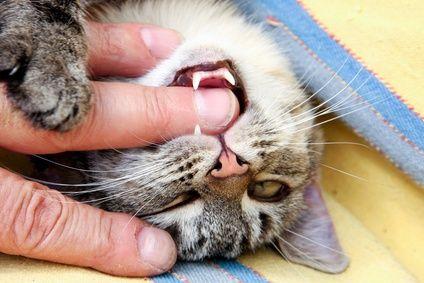It is a rather strange occurrence when you are petting a happy purring cat one second and the next second they are biting on your hand. It seems to be a common action for many feline pets but one that leaves cat owners asking “Why does my cat bite me?”
Much like dogs, there are many reasons and connotations behind a cat’s biting action. Cats tend to resort to biting if they are stressed, frustrated, or afraid. Confusingly enough, they also tend to bite when they are in a playful mood or overly stimulated. Biting is even used as a mating ritual. Some cats who have been declawed resort to biting more frequently to make up for having no claws.
If your cat is sweet and lovable one minute and biting at you the next, he may be telling you that you've crossed the line somewhere. Perhaps you found a sensitive spot or maybe they’re just tired of being petted.
There are subtle warning signs that indicate when this behavior might be coming. You just have to be look out for them. Watch for flattened ears or a flicking tail. Take note if your feline friend starts to stare at you, or if his head starts to follow your hand. They might even release a little growl. All of these can be signs that he's just about had enough and an attack is imminent.
So what if you don’t really find this biting so cute? Then you probably need to teach your cat that biting is unacceptable. This will be easier if he's a kitten, but it can also be managed if he's an older cat.
- Avoid hitting or smacking your cat when they bite. Not only is this mean but it really will only teach your cat to be afraid of you.
- Whenever your cat bites or scratches you, attempt this correction method instead: Loudly exclaim "No" or "Ouch," and then simply walk away and ignore your cat. This is an especially powerful reprimand for kittens and young cats, since they love to play.
- Watch out for and recognize the warning signs, too. If your cat always takes a swipe at you after six minutes of petting, don't push him to the limit. Pet him for four minutes instead.
- Praise and reward your cat for good behavior. Give them a tasty treat after petting them. This will give him every reason to think of petting as a positive thing and not an annoying thing.
 |
Biting is a part of your cat's predatory instincts. You can help him release a lot of energy by playing with him for a few minutes at least twice a day. It can be as simple as dragging a piece of string around for him to chase. |
| Walking away from petting the cat with red bite marks all over his hands led Russ Barker to ask the question "Why does my cat bite me?". Russ is a valued employee and blogger for DogTagArt.com, a company established to ensure that pets all over enjoy safety and security by wearing up-to-date pet ID tags. Their complete line of creative full-color designs make it easy to choose custom dog tags that fit any pet's sense of style. |  |

